Happy 200th birthday, Pride and Prejudice!
As crazy as that might sound, it is the truth. Jane Austen’s wonderful romance novel was first published on January 28, 1813. Originally titled First Impressions, the novel was written by Austen in 1796-7, and was eventually (after numerous revisions by the author) finally published by Thomas Egerton of Whitehall.
200 years later, Pride and Prejudice still remains one of those classic romances that never seem to go out of fashion: it’s been adapted numerous times for cinema and television (including in languages other than English – Dutch, Hindi and Italian are some examples). It’s been twisted and given new shapes, set in milieus ranging from a typical Indian household to a college in the US. It’s spawned sequels, prequels, and more.
So, to celebrate the bicentennial of Pride and Prejudice, a review of the first adaptation that I ever watched. This also fits the theme of this blog, since it’s a pre-70s film. Whether or not it’s an adaptation I’d recommend for someone looking to watch Pride and Prejudice… well, we’ll come to that later.
The story begins in ‘Old England’ [yes, that’s what the title reads. Thank goodness they didn’t spell it Olde Englande]. In the country town of Meryton, the loud [raucously so] Mrs Bennet (Mary Boland) is at a shop with her two eldest daughters, Jane (Maureen O’Sullivan) and Elizabeth ‘Eliza’, or ‘Lizzie’ (Greer Garson), buying cloth.
In the midst of trying to decide between flowered damask and muslin, Mrs Bennet’s attention is diverted by the arrival of a chaise in the street outside. The chaise’s passengers consist of two handsome gentlemen and one lady, all obviously Quality. The shopkeeper, who appears to be as much a busybody as Mrs Bennet, goes off to find out who these people are, and returns with the news that one of the gentlemen is the very wealthy Mr Bingley (Bruce Lester), who has just leased Netherfield Park.
Mrs Bennet – whose ears have pricked up at the sound of Mr Bingley’s wealth – is further reassured when she discovers that the lady with Mr Bingley is his sister Caroline (Frieda Inescort); the other gentleman (Laurence Olivier) is Bingley’s friend, Darcy.
What fabulous news, says Mrs Bennet, already imagining two of her daughters getting married to these wealthy men.
So as to waste no time, therefore, she gathers up the rest of her offspring:
Mary (Marsha Hunt), who is bookish and seems rather half-witted, in the way she gapes and peers about myopically from behind her spectacles. [Obviously, those specs aren’t doing their job].
And Kitty (Heather Angel) and Lydia (Ann Rutherford), both giddy, silly teenagers with nothing on their minds except men in uniform (of whom Meryton has its fair share).
In the meantime, another friend and neighbour – Lady Lucas (Marjorie Wood), mother of Elizabeth’s dear friend Charlotte (Karen Morley) has also heard the news, and has decided that Bingley must be snagged for Charlotte before any of the Bennet girls can lay hold of him. What ensues is a silly and unnecessary bit of idiocy, as the Lucas and Bennet ladies race back to their respective homes in their coaches, egging the coachmen on to overtake the other coach. The Bennet coach wins…
…and Mrs Bennet and her gaggle of girls get home to Mr Bennet (Edmund Gwenn), to whom Mrs Bennet swiftly reveals all her plans. Her husband seems far from supportive, and Mrs Bennet is convinced that he has no fatherly feeling whatsoever for his daughters – when he surprises her by letting her know that he has already made the acquaintance of Bingley when Bingley leased Netherfield. Mr Bennet has even invited Bingley, along with Darcy and Caroline Bingley, to the ball at the Assembly Rooms.
At the ball, all the Bennet ladies are in fine fettle, and Bingley, seeing Jane, is immediately smitten by her. The attraction is mutual, and Mrs Bennet is quite vocal (while chatting with friends and neighbours) about what a fine couple these two will make. Unfortunately, her hopes of Mr Darcy marrying one of her other daughters are dashed: Darcy appears to be a very proud and haughty man who dances almost exclusively with Caroline Bingley, who is as aloof and cold as him.
Lizzie gets a rude shock during the course of the evening. She and Charlotte Lucas are sitting and chatting behind a broad pillar, when they overhear Bingley trying to persuade Darcy to dance – he recommends her, Elizabeth, when Darcy says that there is only one pretty girl in the room (meaning Jane), and that Bingley is monopolising her. Darcy’s reply is that while Elizabeth Bennet is tolerable, he has no inclination to pander to the natives.
This, unsurprisingly, really riles Lizzie. A short while later, Darcy comes along and asks her for a dance [we are given no reason for this sudden change of mind; perhaps Aldous Huxley – one of the writers of the script – suddenly realised Lizzie and Darcy had to get better acquainted at the Assembly ball?]. Lizzie is smilingly caustic in refusing him and going off, instead, with Mr Wickham (Edward Ashley), one of the officers Kitty and Lydia are so keen on.
In the process, Lizzie also discovers that Wickham and Darcy are already known to each other: they bow coldly when they meet, but there is no interaction between them beyond that.
When they’re alone, though, Wickham confides in Lizzie and tells her the reason for this animosity. Wickham had been left a hefty annuity by Darcy’s late father, who had loved Wickham as a son – but Darcy himself has blocked the annuity, leaving Wickham to abandon his dreams of joining the clergy and join the army instead.
Be as it may, the Bennets (especially Mrs Bennet) return from the ball well pleased. Jane has obviously made a conquest, enough for even the hoity-toity Caroline Bingley to have extended an invitation for Jane to come and dine at Netherfield. If Jane has been invited, Jane must go – and endeavour to come back engaged. To this effect, Mrs Bennet (having realised there’s a storm in the offing), sends Jane to Netherfield on horseback…
…with the result that Jane gets soaked, falls ill, and is forced to stay on at Netherfield. Where Bingley, peering over the screen while the doctor gives his long-winded and very technical diagnosis, is able to translate all that medical jargon into simple terms for Jane’s benefit. The simplicity is just as well; Jane’s simpering and idiotic grins seem to indicate that she’s simple-minded, anyway.
Lizzie, worried about Jane, arrives the next morning to enquire after her sister’s health. Caroline Bingley is shocked at Lizzie’s unladylike [read ‘muddy’] demeanour, but the gentlemen – both Bingley and Darcy – are gracious, and impressed at Lizzie’s obvious devotion to Jane. This devotion means that Lizzie ends up spending a few days at Netherfield, looking after Jane, and getting to know Darcy (who improves on further acquaintance, and – to the insightful – looks rather smitten by Lizzie).
Lizzie, however, does not realise this. And Darcy does not speak up.
When the two girls – Jane now well – finally return to their home, it is to find that the Bennets have a guest. This is their pompous cousin, Mr Collins (Melville Cooper), librarian to Lady Catherine de Bourgh (Edna May Oliver), whom he seems to regard as a pattern card of gentility and condescension.
It is Lady de Bourgh who has egged Mr Collins on to find himself a good, sensible bride, and Mr Collins – aware that he is the heir to Mr Bennet’s estates, which are entailed on him – has decided to do the generous deed of offering for one of the Bennet girls. Mrs Bennet manages to let Mr Collins know that Jane is nearly engaged, but Lizzie is not, so Mr Collins gets his hopes up.
Soon after, Bingley hosts a garden party at Netherfield, and the entire Bennet clan is invited. Mr Collins tries to pursue Lizzie – and she is saved only with the help of Darcy, who sends Mr Collins off in another direction.
This gives Lizzie and Mr Darcy the opportunity to chat a little while he tries to teach her archery (only to realise that she is a better archer than him). Lizzie also makes an oblique reference to Darcy’s ill-treatment of Wickham vis-à-vis the annuity, but Darcy doesn’t defend himself.
Things seem to be getting along better and better. Darcy asks Lizzie to let bygones by bygones; shall they be friends? Lizzie is happy to accept [she seems to have conveniently forgotten poor Wickham’s tale of woe]. Only, just at that moment, the pair of them pass by an open window and overhear Mrs Bennet loudly proclaiming to her friends that once Jane marries Bingley, it’ll make it so much easier for the other girls to find rich husbands.
And – poof! – shortly after, the Bennet household receives a terrible shock in the form of a letter from Caroline Bingley. Bingley and she (and Darcy, presumably) have left Netherfield, never to return.
Equally shocking but far less depressing [in fact, a downright relief for Lizzie] is the news that Mr Collins, whose proposal she has turned down in the meantime, has gone and proposed to Charlotte Lucas – and has been accepted.
With Charlotte and Lizzie being such dear friends, it’s hardly surprising that Lizzie should be pressed to visit the Collinses at their home – and that she be then invited to meet the haughty and rather rude Lady Catherine de Bourgh as well. Here, in Lady de Bourgh’s grand mansion, Lizzie meets her nephew, Colonel Fitzwilliam (a very vacuous-looking man in a kilt), and another nephew, this time one Lizzie knows all too well: Mr Darcy. He is considerate and friendly, and Lizzie seems happy enough despite all of Lady de Bourgh’s efforts to put her down.
It doesn’t really come as much of a surprise to us viewers, then, that Darcy arrives at the Collinses’ home a couple of days later, asking to meet Lizzie in private – and proposes to her. He tells her how much he loves her despite their difference in rank and wealth, despite her vulgar relations, despite everything – and Lizzie, of course, flares up and refuses him outright. The fact that she has just learnt (from Colonel Fitzwilliam) that Darcy had been instrumental in breaking off Bingley’s attachment to Jane has got Lizzie even more incensed.
Which, of course, if you know the story, is really only about mid-way. There’s lots yet to come, with a very eventful storyline, some very irritating swooning and screeching by Mrs Bennet, and one of the most horrendous manglings of a perfectly good book that I’ve ever had the misfortune to come across.
What I liked about this film:
I was tempted to leave this out, really, because there was very little I could find to like about this film. But yes, Laurence Olivier does look very good as Darcy.
Greer Garson is lovely in some scenes, but the effect is ruined by totally unsuitable costumes (which, by the way, were reused from Gone With the Wind) and gawd-help-us hair accessories. And, if I am to be very honest, Garson is really rather too old to be playing Elizabeth Bennet.
What I didn’t like, and some comparisons:
In most reviews where I compare a film to another adaptation or to a book from which it was adapted, these are two separate sections. In the case of Pride and Prejudice, I realised that what I hated about this film basically centred around the fact that it messed around needlessly with the source. Austen’s book is wonderfully entertaining: there’s romance by the ton, there’s humour, conflict, and lots of stuff happening. What more could one ask?
Certainly not buffoonery, which is how the script writers (Aldous Huxley, Jane Murfin) and the director (Robert Z Leonard) seem to have interpreted Austen’s humour. The book’s humour lies not just in Jane Austen’s witty narration, but in the delightfully dry humour of some of its characters – especially Mr Bennet and Lizzie.
In the film, while some of the wit has been retained in the original dialogues (most notably Mr Bennet’s and Lizzie’s), there is what seems like an attempt to make this a screwball comedy, which resorts to sheer idiocy at times: the race between the Lucases’ and the Bennets’ coaches back from Meryton; the time Lady Catherine de Bourgh sits down on a music box at the Bennets’; and Jane’s expressions when in love and ill at Netherfield. All of it is really rather unfunny, and excruciatingly so when compared to Austen’s fine wit in the original.
The second major grouse I have with the film is the way Darcy’s character is treated. In the book, Darcy is never the effusive, hail-fellow-well-met type. He is always proud, mostly arrogant, and only unbends quite far into the book – and then, too, his still-dignified charm is directed mostly towards Lizzie and the Gardiners.
In the film, on the other hand, while Darcy has his nose in the air during the first few shots at the Assembly Ball, he (inexplicably) changes tack and begins to be utterly charming to Lizzie soon after. His subsequent behaviour towards her is just too sweet, too obviously besotted, to make him recogisable as Austen’s Darcy.
The last major complaint I have is the distortion of the ending. Why, why, why?! If you’ve seen the film, you’ll know what I mean. If you haven’t seen it, but love the book, then the end of the film comprises enough reason in itself to avoid it like the plague.
There are superficial things that I hold against this adaptation too. For example, the dresses, which are all wrong for Regency England. And Mary Boland’s Mrs Bennet (a character who is irritating, of course, but in Boland’s case, also comes saddled with a very odd accent – Boland was American, and nobody seems to have made much effort to help her manage a Brit accent. Any sort of Brit accent).
So, all in all: a bad adaptation of Pride and Prejudice. I can understand why certain characters (Bingley’s other sister and brother-in-law, the Gardiners, Georgiana Darcy, and Colonel and Mrs Forster among them) could be left out, because of the paucity of time. I can understand that, for the same reason, some events would be telescoped or simply omitted. The problem with this adaptation is that it changes the essence of the book, making this story a farcical, silly one that leaves both wit and romance by the wayside.
Of the many adaptations I’ve seen, the 1940 one is one of the worst. My favourite is the 1995 BBC version, starring Colin Firth and Jennifer Ehle; the 2005 version (with Keira Knightley and Matthew MacFadyen) isn’t bad, either. The 1980 TV series (Elizabeth Garvie, David Rintoul) is a great adaptation, though I’d have preferred another actor as Darcy. Bride and Prejudice, I will admit, I am probably prejudiced against – because Aishwarya Rai isn’t a favourite of mine, and the film itself is too loud for my liking. And Trishna, the old Doordarshan TV series (from the 80s?) I don’t remember much about, except that I liked it.


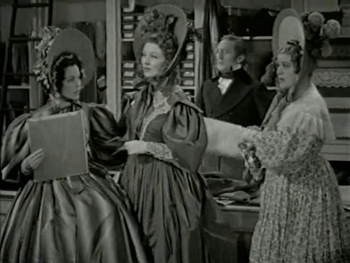

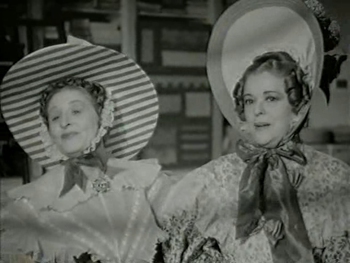

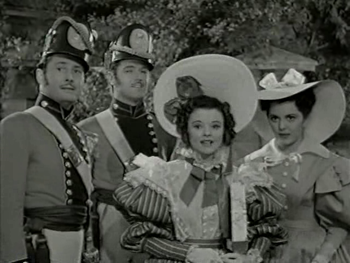
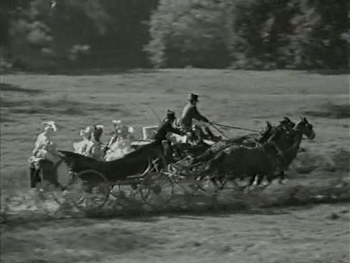
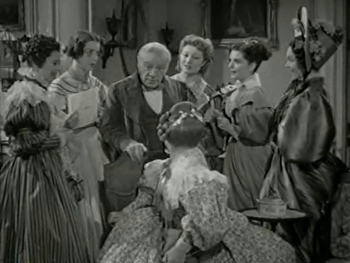


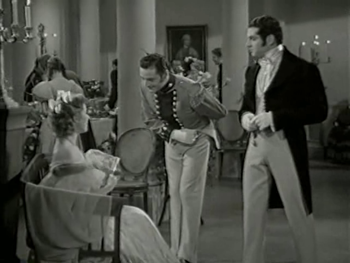
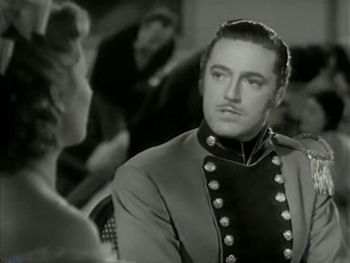

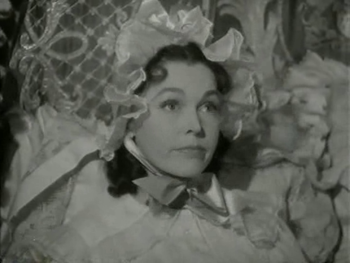
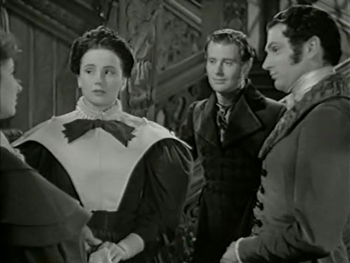
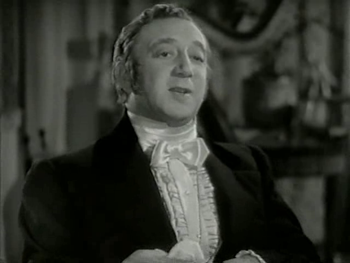
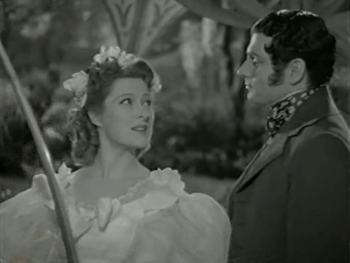
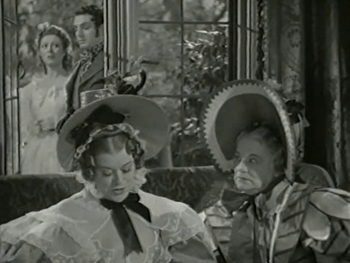
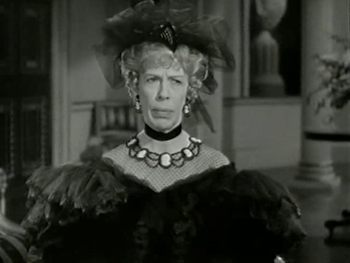
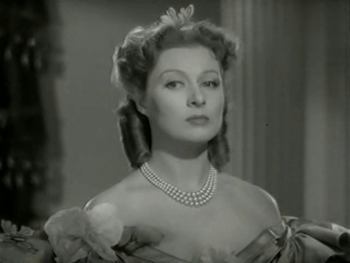
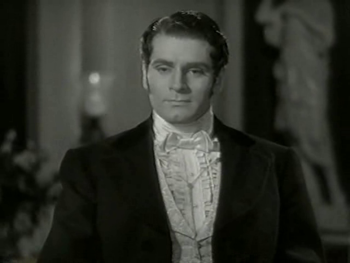
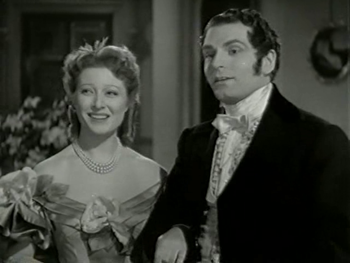
Not much to enjoy I guess especially if you are an Austen fan until your death! Thanks anyway. But P & P cannot be ever as good a film as it is a book.
LikeLike
No, it can never be as good a film as it is a book – I doubt if any film can ever manage that. But this one’s an especially bad adaptation. Sad, considering what great actors both Olivier and Garson were…
LikeLike
Trishna, the Doordarshan TV series (one of my favorites) was telecast in the 90’s,was quite a good adaptation of the novel.Although I think any film adaptation could barely do justice to Jane Austen’s classic novel
LikeLike
I don’t remember Trishna very well – just a wisp of a memory remains – but I do recall liking it a lot when it was being shown on TV. I do wish there was some way of getting hold of it again. I’d love to rewatch it.
LikeLike
me too!
LikeLike
me three.
LikeLike
:)
LikeLike
DO, this is one of the best novels of Jane Austen. She had a great sense of humour. I I best part of the novel is the metamorphosis the characters undergo. Trishna was a very good adaptation, Sangeeta Handa as lizzy and Tarun as Darcy were very good. and the BBC 1995 version was very good too.
LikeLike
The BBC version was so good, Karthik, that when the VCD of it was finally released in India, I bought the second volume of the two-volume set even though the first volume was still not available! :-) I love that adaptation – certainly my favourite. What I especially like about it is that (in my opinion) it manages to retain the essence of Austen’s book. Very difficult to translate onto screen, and of course they can’t manage it completely (that would be impossible), but still…
LikeLike
Oh dear!!!
LikeLike
*grin* That says it all, doesn’t it?
LikeLike
:-D
LikeLike
Absolutely! That does say it all. :-D
LikeLike
Madhu, thanks for an utterly rivetting review, even though you must have suffered the tortures of the damned to do so. It sounds horrible. Echoing your view of the Jennifer Ehle-Colin Firth film to be the best adaptation so far, with the BBC film made for television coming in a close second. Bride and Prejudice doesn’t deserve a mention though I thought Nadira Babbar did a great Mrs Bennet, and both Aishwarya and Namrata did fit their roles. I have very fond memories of Trishna too.
Your review is so much better than this particular film warranted!
LikeLike
Anu, which is this BBC film?
I only know of the BBC adaptation of Colin Firth, and a film with Keira Knightley which wasn’t BBC.
LikeLike
pacifist, there was an earlier adaptation by BBC itself with Elizabeth Garvie and David Rintoul – one must say that it was quite decent, though the 1995 production with Firth and Ehle took over popular consciousness.
BBC adapted this book six times (1938, 1952, 1958, 1967, 1980, and 1995). It was adapted in Italian and Dutch other than the other adaptations mentioned in the post and comments.
LikeLike
Oh that one? I got confused with the word ‘film’.
In fact I love this adaptation very much, and it has my favourite Eliza. Elizabeth Garvie fitted the description of ‘little Lizzy’, as Mr Bennet called her, very aptly. Though I love the Colin Firth P&P equally well, I don’t care for Jennifer Ehle’s Lizzy much.
I wish BBC would take out DVDs of it’s past adaptations of her novels. The earliest ones that I have are from 1971 (a sense and sensibility adaptation) and 1972 (an Emma adaptation).
LikeLike
I’m with you on that, pacifist! I liked Elizabeth Garvie a lot, too – she was how I’d imagined Lizzie. It took me a while to get used to Jennifer Ehle’s Lizzie – just not my Lizzie, but subsequent rewatches of the 1995 series have helped me like her more. Whatever, I still do like Ehle more than Keira Knightley.
LikeLike
When I say ‘the earliest ones that I have’ it means there are none before that on DVDs :-D
LikeLike
I’ve actually mentioned (though not linked to) the Dutch and Italian adaptations in the post, Anu. Somebody’s uploaded the Dutch version (a TV series) on Youtube, but I don’t think there are subtitles for the entire series. Here’s the first episode:
LikeLike
We should all, beg, plead, request raja to subtitle this. :-D
LikeLike
Only the first 6 minutes have been subtitled. :-(
LikeLike
Yes, I know. :-(
Maybe if we get together and plead really hard (perhaps bribe him a bit?), Raja will do us all a favour…
LikeLike
Thank you, Anu! Glad you liked the review – even though I didn’t like rewatching the film. :-( The only time I did enjoy this film was when I watched it the first time, as a pre-teen. I hadn’t read the novel then, so this was fine by me. Ever since I read the book, the very thought of this adaptation makes me shudder. Thank goodness I’ve now reviewed it on this blog, and don’t need to revisit it!
LikeLike
Count me in as yet another person whom Jennifer Ehle’s Eliza left cold. I did like Colin Firth as Darcy, though. :)
LikeLike
As far as I’m concerned, Colin Firth is the best Darcy – he managed to be proud and stiff-upper lipped, and later romantic without being flippant. Just perfect! :-)
LikeLike
A thought just entered my head DO. Jane Austen would have loved the irony of celebrating 200 years of P&P with this film :-D
LikeLike
To quote a sentence from Northanger Abbey – she would have probably uttered (like Mrs Allen);
How very provoking!
LikeLike
Hehe. :-D
Yes, it is ironic that the only version of Pride and Prejudice that fits my blog’s preferred ‘period’ – and is easily available, plus in a language I understand, should be so vile.
On the other hand, it’s probably a fitting tribute to Austen’s ability. Her book was so utterly wonderful that even acclaimed writers like Aldous Huxley couldn’t come anywhere close to doing justice to it! ;-)
LikeLike
Pride and Prejudice is my fav from Jane Austen’s works and the only one, whose plot I remember. I tried to watch the Keira Knightley version sometime back on TV, but just got bored afterwards (I see Reeba throwing a frying pan at me).
I wonder if I would like the book if I read it now. But I remember being very totally enthralled by the book and reading it twice in one year. Quite unusual for me.
Just like you and many others here, loved Trishna at that time. Wonder how I would react to it now. Padma Bhushan played Mrs. Bennett, if I remember right.
BTW, I never knew that Laurence Olivier played Darcy. What a good casting!
Thanks for the amusing review, Madhu. Enjoyed going through it.
LikeLike
> I tried to watch the Keira Knightley version sometime back on TV, but just got bored afterwards (I see Reeba throwing a frying pan at me).
No, harvey, I would throw that pan at Deborah Moggach (scriptwriter), and Joe Wright (director).
I’m quite a purist, and the dumbed down Keira Knightley version is not something I approved of. Though it’s still better than the reviewed version here.
LikeLike
“No, harvey, I would throw that pan at Deborah Moggach (scriptwriter), and Joe Wright (director).”
Same here, pacifist! Yes, I hated that dumbed down version too. And I think, despite that, it’s still better than this travesty.
LikeLike
I was seeing your throw a frying pan at me for having the audacity to be bored at all by Pride and Prejudice. ;-)
Saw the wonderful pics of your numbered, reprint first-edition P&P. Enjoyed them!
LikeLike
>I was seeing your throw a frying pan at me for having the audacity to be bored at all by Pride and Prejudice. ;-)
With any of her books perhaps, but hardly an adaptation ;-)
BTW P&P isn’t my favourite novel of hers. In order;
Emma – 5
Nortahnger Abbey – 4 and 1/2
Sense & Sensibility + Persuasion – 4.35
P&P – 4.2
LOL
LikeLike
PS: missed out Mansfield Park – 4.2
LikeLike
Hmm. You obviously know your Austen very well, pacifist! I have read all of these, but except for Pride and Prejudice, I’ve never re-read any of them. Time to do that, I guess!… now, if only I could find the time.
LikeLike
The only reason for this DO, is because, I’m not a great reader. I run miles from modern literature. Only read classics, with heavy emphasis on JA, because I just love her style of wrting. There is a new set of detective/mystery books set in historical times which has caught my attention, though. I love reading them :-)
LikeLike
Oh, pacifist. You are such a sweetie. Thank you! :-)
P.S. Unless I am barking up absolutely the wrong tree! LOL.
LikeLike
You aren’t. :-)
LikeLike
Yippee!! Thank you. :-)
LikeLike
Persuasion is my least favourite of Austen. :) It’s interesting how we can all like different books. *grin* My list would go like this:Emma followed by Pride and Prejudice, Sense and Sensibility, Northanger Abbey, Mansfield Park, Persuasion.
LikeLike
>Persuasion is my least favourite of Austen.
I wouldn’t say Pride and Prejudice, and Mansfield Park are my least favourite – they are my 4th favourite with very little difference between each. :-)
For me nothing is least about any of JA novels. As you say it’s interesting how we see books differently.
LikeLike
I happened to watch The Winslow Boy yesterday, and was reminded of how completely delicious Jeremy Northam was as Mr Knightley. Another film I must rewatch. :-)
LikeLike
I have a bluray version of this, and it is fabulous. I watch it again and again just to watch the play of firelight, candlelight, and sunlight coming through doors and windows – of course Jeremy Northam too. :-)
What did you think of the one with Kate Beckinsale (sour looking) and Mark Strong (a very angry Mr Knightley)?
LikeLike
I haven’t seen the Kate Beckinsale one, unfortunately. But somehow Mark Strong has always struck me as rather grim – not the sort of man I’d visualise as Mr Knightley. What did you think of it?
LikeLike
Dear pacifist, why don’t yous tart a blog and review these books. It would also be interesting to read a chapter by chapter review!
LikeLike
Arre nahin. I’ve visited a forum for 10+ years, split hairs on interpreting sentences from chapter to chapter in Group Reads of the novels, which lasted as many days as the chapters, and plus some for wrap up.
Interaction was interesting.
There was a lady who pointed out facts from the Life and Times then, for better understanding.
It involves a lot more than one thinks. :-)
LikeLike
So more the reason to share!
LikeLike
sachi Harvey. So inappropriate of you. To ask PI to tart a blog.
LikeLike
LOL!
LikeLike
Yes. This is not to be borne. :-D
LikeLike
:-)
…avgun mere bhula dena!
LikeLike
@harvey
>Saw the wonderful pics of your numbered, reprint first-edition P&P. Enjoyed them!
I missed this.
Thank you harvey. It’s a cherished possession along with a couple of others :-)
LikeLike
I also usually remember Sense and Sensibility, but not as well (and not in the minor intricacies of the plot) as I do Pride and Prejudice. But that’s probably because I’ve read the book so many times, and watched different cinematic adaptations of it so often. It’s a bit like Beauty and the Beast, in that sense – adapted over and over again. :-)
Yup, Laurence Olivier played Darcy. Looked good, and would’ve been great too if his character had remained true to the Darcy Austen had created. This frivolous and mooning-over-Lizzie Darcy did not appeal to me one jot.
LikeLike
What? A frivolous Darcy?
tch, tch, tch…
LikeLike
It is. :-( He’s so not Darcy.
LikeLike
>What? A frivolous Darcy?
Harvey you sound like Caroline Bingley in the 95 BBC version, when she says to Eliza;
What? A fault with Mr Darcy? LOL
LikeLike
:-D
I thought Anna Chancellor was really good as Caroline Bingley in the adaptation – so deliciously catty!
LikeLike
That was my intention! Do you really think I go along having such airs? ;-)
LikeLike
Harvey Mrs Bennet was played by Ratna Bhushan and not Padma Bhushan btw who is Padma Bhushan? Never heard of her. Ratna Bhushan was formerly Ratnamala. She changed her name to Ratna Bhushan after marrying Bharat Bhushan. You can see a very young Ratnamala next to Shyama in this song
LikeLike
Maybe Harvey was thinking about the national awards in India when he wrote that! :-D
I think you were the one from whom I first came to know that Ratna was Bharat Bhushan’s wife. I’d forgotten that she’d acted as Mrs Bennet.
LikeLike
Now that I think of it there is or was a Marathi film actress by the name of Padma Chavan, but I do not think there is or was any Padma Bhushan or maybe as you say he was thinking about the national awards :-D do not blame him the awards are in the news.
LikeLike
Naturally I meant Ratna Bhushan. Thanks for the correction. She and her husband used to appear together in some Hindi plays on Bombay DD in the early 80s.
Ratna Bhushan/Ratnamala is also in the Kaagaz Ke Phool song.
LikeLike
One of my favourite ‘on the road’ songs! Love it. :-)
LikeLike
If anybody understands Italian, there’s this version too (here’s the first part):
Now if only someone would be kind enough to download this and subtitle it!
LikeLike
This is not bad. Starts in a sinister manner with a – duel :-D with Darcy as a second, and Bingley fighting it.
The costumes, hairstyles are fine.
Lizzy is beautiful, and quite suitable. Lydia is the tallest here. In fact all characters suit. Darcy has the appropriate expressions :-)
Some characters are missing here too, especially the Hursts. And of course combining two situations into one is probably a way to keep within time limits.
The scene settings are quite good too.
This one would be interesting if it were subtitled.
LikeLike
I didn’t watch too much of this beyond the credits, but that duel at the beginning intrigued me too. I can imagine Darcy duelling (maybe with Wickham post the Georgiana episode?), but Bingley has somehow always struck me as too sweet and spineless to go in for something like that.
Now I wish someone would subtitle this!
LikeLike
Ah, ‘Trishna’, now that you mention it, I begin to remember glimpses too. I hated ‘Bride and Prejudice’ the first time I saw it, but was more tolerant the next time. This sounds like a horrendous version.
LikeLike
I only saw Bride and Prejudice the one time. Maybe I should give it another try.
It beats me why Hindi cinema doesn’t seem to have made any versions of Pride and Prejudice, considering this story could fit so well into an Indian milieu – Trishna is evidence, and in some ways so is Bride and Prejudice.
LikeLike
DO. Please delete my comment in response to yours beneath the Dutch P&P. It’s a long one, so I thought I’d write it here.
The subtitles came up at the end too. The last 3 minutes or so. My impressions;
Darcy – smiles too much. LOL
Lizzy – gets angry and gnashes her teeth a lot in the beginning, unlike the more often than not, amused Lizzy.
Costumes are pre-regency, suitable for Mrs Bennet, but the men have a coat with an extremely high waistcoat part. Looks odd. Women have a short hair style which was perhaps in London but definitely not in the provincial Longbourne/Meryton.
The things in the book do happen here, but all at the wrong time, and situations.
The episode starts with a lot of ‘telling’ which even in a novel JA avoided. ‘Show not tell’ was her style.
Now what should we bribe Raja with? Any ideas? :-D
I doubt he’s reading this. Men, you know, think it beneath their dignity to acknowledge Jane Austen’s work. ;-)
LikeLike
………Harvey being the exception of course :-)
LikeLike
I admire your patience, pacifist – I only watched a very little bit, didn’t even pay much attention. Mostly, I guess, because I hate coming up against something I can’t understand but may like if I could understand… sounds complicated, I suppose. But that’s why I never watch films in languages I don’t know unless they’re subbed (or, occasionally, dubbed).
LikeLike
Madhu ji,
Wonderful.
My first book from Jane Austin was Pride and Prejudice,when I was in school.I was so impressed with her style that I tried and got her other available books and read them too.
I simply love her writing.I think some of the books reflect her own life.
Thanks for reviving old memories.
-Arunkumar Deshmukh
LikeLike
Thank you, Arunji! On Facebook, Beth had written that it seems only women read Pride and Prejudice, so I’m glad that you and Harvey have proved her wrong. :-) I think Austen’s writing is wonderful too.
LikeLike
Yes. I once read an article where this male writer kept praising Charles Dickens for his writing which exposed the poverty and crime in the society.
He failed to understand that JA was also exposing the plight of women in society. But that wasn’t important for him, of course. OR perhaps, he didn’t get it.
The same author (and many others) went on to accuse her of being too flighty, only interested in gowns and bonnets. This of course he caught superficially from her letters to her sister. Again, missing her wit, and irony.
To quote one such from a letter, which makes me grin, but he (and many other men) didn’t get;
“Next week [I] shall begin my operations on my hat, on which you know my principal hopes of happiness depend.”
There are other such statements in her letters, which go over their heads, and they class her as ‘typical female’. Makes me so angry.
I’m not including Arunji and Harvey here :-)
LikeLike
Pacifist, your comment reminded me something similar I’ve noticed. One of my favourite writers is Georgette Heyer, whom I simply adore for her charm and wit. And I don’t know how many times I’ve tried to tell friends and relatives that she is not just another ‘romance writer’ (their idea of romance novels is Mills and Boon, and they think Heyer is that type). Now I’ve given up – if they will self-delude themselves, without having read Heyer, that she writes sappy, silly romances, then why bother?
But I do know of some men who are avid fans of Heyer too. :-D
LikeLike
Madhu ji,
I dont subsribe to the philosophy of Typical Male or Female writers. Good literature is for all to enjoy,irrespective of who has written it.
Novels and short stories or dramas for that matter can not be classified as ” for gents only or for Ladies only”. I am sure,even the writers may not be thinking like this.
I have read many Mills and Boon novels myself and do not find anything wrong in it as much as some girl enjoying a spy or war novel !
-AD
LikeLike
Exactly, Arunji! I’m so glad there are men like you. :-) I don’t see why, logically, people should think that certain genres are meant only for women or only for men. If that was the case, I probably wouldn’t be reading Alistair MacLean or all the many, many detective novels I do (and, of course, I wouldn’t be writing the Muzaffar Jang books).
LikeLike
*Awed* You like Georgette Heyer too?? *Sister, sister, come into my arms….* (Yeah, I mixed up two things, but…)
Her romances were never silly and soppy! Those people don’t know what they are missing!! I’m glad S likes Heyer as much as I do. What I love most (other than the strong, spunky heroines and the absolutely sparkling wit in her dialogues) is the fine attention to detail, and the research that obviously went into every single book of hers!
Have you read her detective fiction too? I like those as well, though they are more modern in their settings.
ps: For pacifist: Have you seen Emma with Kate Beckinsale? I thought she was the most definitive Emma I had ever seen!
LikeLike
Yay! I should’ve known you would like Heyer too, Anu! :-) One of the greatest compliments anybody ever gave me about my writing (two people said this, actually) was that it, at times, resembled Heyer’s. I don’t think so, but I was totally chuffed. She writes so brilliantly. And I have read most of her detective fiction, too – loved that as well.
LikeLike
After I read your books I went on to re-read some of my Heyers because you brought her to mind. It was the attention to detail and the richness of the historical context that the two of you resembled each other in. I would say you have very different writing styles, but you did remind me of her…
LikeLike
Thank you for articulating that so well, Sucheta! I honestly didn’t think my style resembled Heyer’s, but what you say makes sense. Thank you. :-)
LikeLike
Yes, I have. Lack of space here so I’ve answered it along with DO’s question in a fresh new comment at the bottom. :-)
LikeLike
Pride and Prejudice along with Tagore’s Wreck and Gora are my all time favourite novels. I try not to miss an versiony of P&P, needless to mention I have seen this one too but yes I did avoid Bride and Prejudice for I am no Aishwarya fan. Trishna and BBC versions too were good. If some more versions came along I would see them to. that is the kind of diehard P&P fan I am.
LikeLike
You did well to avoid Bride and Prejudice, Shilpi. I honestly don’t think you’d have liked it. There’s another one that I’ve seen, which stars Orlando Seale and is set in 21st century USA:
http://www.imdb.com/title/tt0366920/
I’ve seen this too, and it was very forgettable.
LikeLike
Yeah I think I saw bits and pieces of this one not the whole film. Now I will not bother to see it since you do not recommend it.
LikeLike
Here’s a Pride and Prejudice quiz to celebrate it’s 200th anniversary.
http://www.telegraph.co.uk/culture/books/books-life/9831077/Pride-and-Prejudice-at-200-take-the-quiz.html
LikeLike
Ah, I am feeling very pleased with myself. 100%. :-)
LikeLike
Well done!
I got one wrong, so 92% :-D
I know nothing about sequels, so the question about who wrote about the murder at Pemberley or some such thing, I picked out a writer with a woman’s nemae clearly mentioned, which was wrong.
LikeLike
Oh, that one. I must admit to being partly lucky in that. I guessed it would be one of two people – James or Rendell – and was just lucky in my choice.
LikeLike
Here’s a ‘cartoon’ celebration of the 200th anniversary :-D
LOL they are so funny.
http://www.npr.org/2013/01/27/170253360/pride-and-prejudice-turns-200
LikeLike
Hehehe. That is fun! Thank you for sharing this. :-D
LikeLike
@Anu
>I thought she was the most definitive Emma I had ever seen!
She was nothing like the image of Emma I have. Of the four Emma’s available, I dislike her completely.
-her expressions ranged from sour, to mean looking, to mocking. Yes, sometimes she looked normal.
-She was the cliché type rich woman dressed up fashionably (all wrong, because Emma was provincial, didn’t care about how she looked, – her hats were annoying me a lot :-D)
-this stood out even more because of the contrast with a mousy Harriet (also all wrong – Harriet was actually very pretty, and was quite well dressed).
A combination of Gwenyth Paltrow’s Emma and 1972 BBC’s Doran Godwin’s Emma would be perfect.
@DO
>What did you think of it?
Well, in addition to the unpleasing Emma (as mentined above), the film had an air of negativity about it. There was nothing nice going on.
– Mr Knightley stalked around angrily most of the time,
-Emma had those sour looks,
-Miss Bates didn’t talk long enough,
-and the ending – ufff!! It was changed.
OK cinematic allowance is allowed. Even the best ones don’t follow the book absolutely, but as I said, the air of negativity effects me and I see everything in that light too.
Andrew Davies tried to put forth his social point, by making the rich look ridiculous.
There’s this strawberry picking scene where they show them kneeling on cushions near the strawberry beds to pick them, and a servant behind each, who was given a signal to move the cushion to the next point. I wanted to pull my hair out in exasperation with this all too obvious show of his personal opinion.
LikeLike
pacifist, LOL. I don’t remember the film at all, but I definitely remember Kate Beckinsale’s portrayal of Emma. See, my problem is I do. not. like. Gwyneth Parltrow at. all. So it is very difficult for me to watch her onscreen and like her. It shows my bias, but I’m honest about it. :) As for the movie itself, as I said, I do not remember much of it. So I’ll take your word for it that it was awful.
Madhu, I was one of them (who thought your writing mirrored Heyer . :) I think I said that when you had sent me one of your Muzaffar Jang stories to read.
LikeLike
>my problem is I do. not. like. Gwyneth Parltrow at. all.
Anu, that’s wasn’t my problem because I didn’t know who Gwenyth Paltrow was. :-D I still haven’t seen her in any other film, not being interested in Hollywood films or stars (she ‘is’ Hollywood, isn’t she?).
To me she was *that actress* who played Emma, and wasn’t
bad. She carried off Emma’s bad conduct in quite the way I’d imagined – with self importance, a know all, rather than any result of a bad trait in her.
LikeLike
Ah, so you were one of those who compared my writing to Heyer’s! I should’ve known. A cousin of my brother-in-law’s also thought so. Thank you, Anu. :-)
LikeLike
Thank you for giving me your feedback on that, pacifist. I think I shall pass it up!
LikeLike
I scored %100 (but to be honest it was a rather easy quizz)
Emma is my least favorite Austen (I just can’t like Emma) but I love Clueless and find it the best adaptation I have watched so far (although Mr.Northam is easly the best Knightley – isn’t this a delightful name btw?)
My fave P&P adaptation is 1995 BBC (of course) and my favorite Darcy.
Colin Firth made an excellent Darcy and despite the fact that I didn’t like the latest film adaptation (Keira Knightly is so hard to watch for some reason, she is pretty, a decent actor too but I have trouble watching her) Matthy Macfadyen did a decent job as Mr.Darcy.
Thank you for sparing me the pain of watching this.
LikeLike
>(I just can’t like Emma)
Yes, a lot of people don’t like her. Jane Austen herself said. ‘I’m going to take a heroine which no one but myself wiill like’ – may not be the exact wording.
More than Emma the character, I love the construction of the book, her manner of writing, and the well developed characters in situations so very familiar.
It’s a mature and much improved writing style, where the narrator goes in and out of Emma’s head and you are left calculating, did Emma think this, or did the narrator say this? Brilliant!
And it’s so funny too.
LikeLike
And to top it all, Emma is a mystery book, quite a prototype of it. :-)
LikeLike
Hmmm. It’s obviously been far too long since I read Emma, since I don’t remember the writing style etc – just the basics of the plot. High time I read it again!
LikeLike
This was only after reading it several times DO, and also mainly due to the input of others during group reads.
What many ardent fans of Elizabeth don’t realise is that Emma and she share a lot of characteristics except those that came about because of their financial status. :-)
LikeLike
I’m afraid I have to admit that I rather like the 1940 P&P. Greer Garson is the only Elizabeth to retain the ‘archness’ ascribed to her in the book, and Mrs. Bennet truly looks as if she would have been beautiful in her youth. The way Mr.Collins proposes really makes me laugh, and the scene where Lydia and Wickham visit Longbourn is the best. Lydia is shameless, Wickham is impudent, and Mr.Bennet cannot bring himself to shake hands with him. Of course, I do not like Mr.Darcy and Lady Catherine having their characters changed.
LikeLike
I agree with your observation of Mrs Bennet actually looking as if she could have been beautiful in her youth – very true. Also a couple of the other things you point (especially the one about Lydia and Wickham’s visit to Longbourne), but as for the rest – well, let’s just say the world would be a boring place if all of us agreed on everything!
LikeLike
“What many ardent fans of Elizabeth don’t realise is that Emma and she share a lot of characteristics except those that came about because of their financial status. :-)”
I have to disagree, they do share some treats but for any reason (financial status, having lots of siblings etc.) Elizabeth is much more sensitive and modest, her sarcasm and critiqué are aimed at people who are higher in status/financials and make a big deal out of it. She is naturally kinder than Emma whose wit (unfortunately nowhere near Elizabeth’s) is rather towards people who are less strong than her (socially and financially). This is the main reason I can’t like Emma, because she is unkind and bored.
LikeLike
Hope DO won’t mind us turning this into a JA forum :-)
>Elizabeth is much more sensitive and modest,
>She is naturally kinder than Emma
Nowhere in the book is Elizabeth described as such, in as many words, but Emma is – by the author herself;
Emma was very compassionate; and the distresses of the poor were as sure of relief from her personal attention and kindness,…
I think Elizabeth’s remark of;
She’s sickly and cross
..was not very kind. It showed a mean side in her, to gloat over the sickliness of a person she thought would marry Darcy (just because she wanted to get back at him for his remark). Anne had done her no harm. Anne should have aroused her compassion.
Unless, of course you think this is very wittily directed at a person belonging to a higher class, so it doesn’t matter.
> whose wit (unfortunately nowhere near Elizabeth’s)
That’s a matter of opinion isn’t it? Depending on your preference of the quality of wit ;-)
But I suggest you read some of her exchanges with Mr Knightley.
>is rather towards people who are less strong than her (socially and financially).
Don’t forget that Lizzy happily joins this socially and financially higher class. ;-)
Give me one charcter in the book who is less, socially and financially than the Bennets – and where Eliza interacts with them.
To criticize people of a higher social ranking by people not belonging to it is not difficult ;-) I’d praise one belonging to it and being critical.
LikeLike
I do not mind you turning this into a Jane Austen forum at all! Be my guests. Actually, it’s interesting for me to see what people who know her work so closely can discuss it – I learn more in the bargain!
LikeLike
“Emma was very compassionate; and the distresses of the poor were as sure of relief from her personal attention and kindness,…”
Actually, I do not remember the specific quote but I always see praising Emma in the book itself is as Austen’s sarcasm.
And the things I said about Elizabeth is what I observe in the book.
Yes she thought of that about Anne but she never said it out loud. One of the many charms of Elizabeth is that she is not an angel like Jane. She is capable of thinking ill of people who has never done any personal bad to her but she never demeans them in public as Emma did.
Emma is impressionable and thinks highly of herself.
Elizabeth is not impressionable and she makes fun of people who think highly of themselves (even then she is never as unkind and as thoughtless as Emma)
I’m still eager to hear the similarities about the two since it was what promted me to write a response.
LikeLike
>Actually, I do not remember the specific quote
Chapter 10. If you have a penguin edition: page 68, 3rd para, 2nd line ;-)
>I always see praising Emma in the book itself is as Austen’s sarcasm.
Always?
Now, why would you do that?
Unless you want to :-)
What sarcasm do you see in what I quoted?
As for JA being tongue in cheek (not sarcastic) about Emma, that’s part of the pleasure, charm, and humour in the book.
Gwenyth Paltrows adaptation brought it out so well, especially when one moment she refuses to play the piano, followed by Mr Cole saying he’ll ask Jane to do so, and immediately cutting to the next scene we see Emma at the piano. :-D
>One of the many charms of Elizabeth is that she is not an angel like Jane.
It’s not just Elizabeth, but all her heroines are flawed in some way or other (except perhaps Fanny in Mansfield Park – nearly). I say ‘flawed’ which are not inherent, but actually just a growing up process, with Emma being the most flawed – not because she ‘is’ the most flawed, but because she is the most rounded, well developed, and multi dimensional of all JA characters, and we get a good insight into her thoughts and behaviour.
JA once remarked in her letter;
Pictures of perfection make me sick and wicked.
>She is capable of thinking ill of people who has never done any personal bad to her but she never demeans them in public
…aaaaand that is OK? ;-)
> as Emma did.
But the point is, Emma doesn’t do it deliberately to demean. She was thoughtless – which can be a major flaw causing hurt, but still different from being deliberately harmful. In addition, it wasn’t as if Emma made a habit of doing that all the time.
It was a blessing in disguise, as far as I’m concerned, because it was a turning point in her reforming.
Wouldn’t you forgive her for being repentant? :-)
I would, perhaps you don’t want to. That’s OK.
LikeLike
>Emma is impressionable and thinks highly of herself.
Elizabeth is not impressionable
Elizabeth is extremely impressionable. Who sits and listens to a person you’ve just met, talking bad about another?
Elizabeth did!!
Listening to Wickham complain about Darcy when she hardly knew him. Isn’t that called being impressionable?
The reason is because Elizabeth thought highly of herself and her opinion about people, and if she had decided Wickham to be good, then he was!!
Elizabeth thought so highly of her own opinion and herself, that she even looked down upon her mother (following her father’s footsteps, even though she realises that his treatment of her was not good), and was so intolerant towards her (like Emma with Miss Bates, who wasn’t her mother).
Elizabeth is quite thoughtless where her mother is concerned.
You might also be surprised to hear that of all her sisters, Elizabeth and Lydia are the closest in character.
>I’m still eager to hear the similarities about the two since it was what promted me to write a response.
Superficially, we have already discussed the above similarities about being impressionable, and thinking highly of oneself. They both are witty (though you’ve rejected Emma’s wittiness), they are both lively, like Elizabeth, Emma is described as running out of the room – to laugh, and both are intelligent.
A deeper discussion would be an uphill task, since you’ve already shown your ignorance about the passage I quoted from Emma, and what’s to say you wouldn’t about others – which I would have to quote to bring up my points?
And of course it would also consume a lot of time, and days :-)
LikeLike
Pasifict, first of all I’m very sorry to cause an obviously not so welcome effort in replying my post. Obviously you are so high in your understanding and interpretation of Austen’s novels and again obviously you do not consider me in the same level so please do not be inclined to fruther reply (especially to further quote since I do not want to engage you in something that will consume a lot of time and days).
Elizabeth is impressionable yes, it was hasty of me to type it that way and my incompetence in trying express. Elizabeth by nature inclines to be on side of the weaker side (as she sees it that is) as opposed to Emma who is class conscious and tends to see herself above many people in her circle intelligence wise.
Elizabeth did not think highly of herself but she also doesn’t allow herself to be belittled either.
Apart from both of them being witty and lively (which the majority of Austen heroines are) I still fail to see how Emma is the Austen character most similar to Elizabeth but as I have mentioned above I do not feel qualified to further discuss this with you.
Thank you taking time to write, and please know that it is my utmost pleasure to relieve you from this uphill task :)
Also thanks to Dustedoff for being generous enough to permit the exchange. Cheers!
LikeLike
Elizabeth, there’s no need to play the victim. ;-)
I was offended when you made it sound like I was inventing quotes to support my views.
It *is* an uphill task (also time consuming) to be getting into a study of characters to find their similarity or dissimilarity – when all the while the other person’s mind is all made up.
>obviously you do not consider me in the same level
:-D
I clearly don’t know your level, since you were the one challenging me, and making me work to find answers to your hostile questions.
I see a discussion in a very different light, totally based on what’s written in the book (not in adaptations) and quoting it to support your view. You never did that even once. Just threw around what you ‘thought’.
No hard feelings. I must thank you for reawakening my desire to read the books again. I haven’t read them since ages as presently I’m mostly interested in old Indian films, with dustedoff coming up with delicious reviews and posts. :-)
LikeLike
This thread was the first i came across on your blog – and it actually inspired me to revisit the novel, after over a decade – and i’m so glad I did – I devoured it in a couple of days and remembered how much I’d enjoyed it during high school.
Trying to avoid reading more Austen for now though – I’m trying to get into War and Peace but it’s a monster!
My favourite Novel remains Middlemarch – read it during school days and again last summer and it is truly perfect :-)
Thanks for the review of the movie – made me laugh – I’ve not seen it, but this week I did watch the 70’s version as well as the Keira Knightley movie, but none match the 1995 version for me. Would love to see Trishna but it doesn’t appear to be available :-o
S.
LikeLike
War and Peace is on my list too. It’s lying there, waiting to be read, but I just can’t summon up the courage: just the size of it is daunting!
I have to admit I haven’t read Middlemarch till now. Thank you for the recommendation – I’ll read that. I think my sister has a copy that I can borrow.
The 1995 version of Pride and Prejudice is unbeatable, as far as I’m concerned, too. It outstrips every other version that I’ve seen.
LikeLike
Thank you for this post and for reviewing my least favourite version of P&P (also saw the Orlando Seale one recently, but that can barely be called a modern adaptation, it’s so boring!). I remember watching this film with an introduction before it from Carrie Fisher and Roger Ebert, who were showcasing classic films on an American network (can’t recall the name). They spoke about the reused costumes etc., but I was least prepared for this disaster of a Darcy interpretation from someone like Laurence Olivier! Sorry if I sound harsh, but those effeminate hand movements and besotted lover bits were starkly in contrast with the cold Darcy I had read and seen. And Lady Catherine acting as cupid was another letdown.
1995 version is wonderful and closest to books. Colin Firth is a delight, and all the eye locks, glances, exchanges add so much nuance. As one YouTube comment said, there was so much romance in these gestures in Regency era!
The 1980 one has such a handsome David Rintoul Darcy, but as many comments note, is stage like due to production. If anyone ever finds Trishna, please make it available, have heard so much about it. Think it was broadcast in mid to late 80s when I was a kid.
A good, modern, fun adaptation is The Lizzie Bennett diaries (3 to 5 minute videos in vlog form), if someone wants to check them out (all episodes on YouTube).
I like the 2005 version as well (unpopular opinion, going by comments :P), as I read one article on it which said this Joe Wright adaptation captures the youthfulness of Lizzie, as opposed to matronly traits in others. Love the soundtrack and cinematography in this, and Macfadyen makes for a dishy Darcy.
Sorry for the long comment, difficult not to gush when it comes to Jane Austen/ Pride and Prejudice.
Think this is my last one for the day :)
LikeLike
It’s taken me a while to get around to replying to this comment – I’ve been busy half the day, and feeling horribly unwell the rest – but I did read this comment earlier, and the first thought that popped into my head was “There’s an Orlando Seale P&P? Where? When?!” (I like Orlando Seale, you see; not mad about him, but yes, I do like him).
… and now, when I look up IMDB, I realize I have seen the film in question. How forgettable it was, that I shouldn’t even remember seeing it.
Since I wrote this post, I have seen the David Rintoul series. I thought the Lizzy there was very well done, but the overall production values weren’t great – as you mention, it looks as if everybody’s on stage. I still think the Colin Firth version, all said and done – chemistry, treatment, production values, translation to screen – is the best. :-)
I have sort of given up hoping for Trishna to surface. I had already read P&P by the time Trishna was aired, and so I was able to appreciate that they really did justice to the adaptation – very believably Indian, yet also very true to Austen’s book.
LikeLike
Thanks for the reply, hope you feel better soon! You had mentioned the Orlando Seale one in a comment above (in 2013), so I wrote about that too, saw it last month. Forgettable film, of course :)
LikeLike
Ack! Now you can see just how forgettable. ;-)
LikeLike